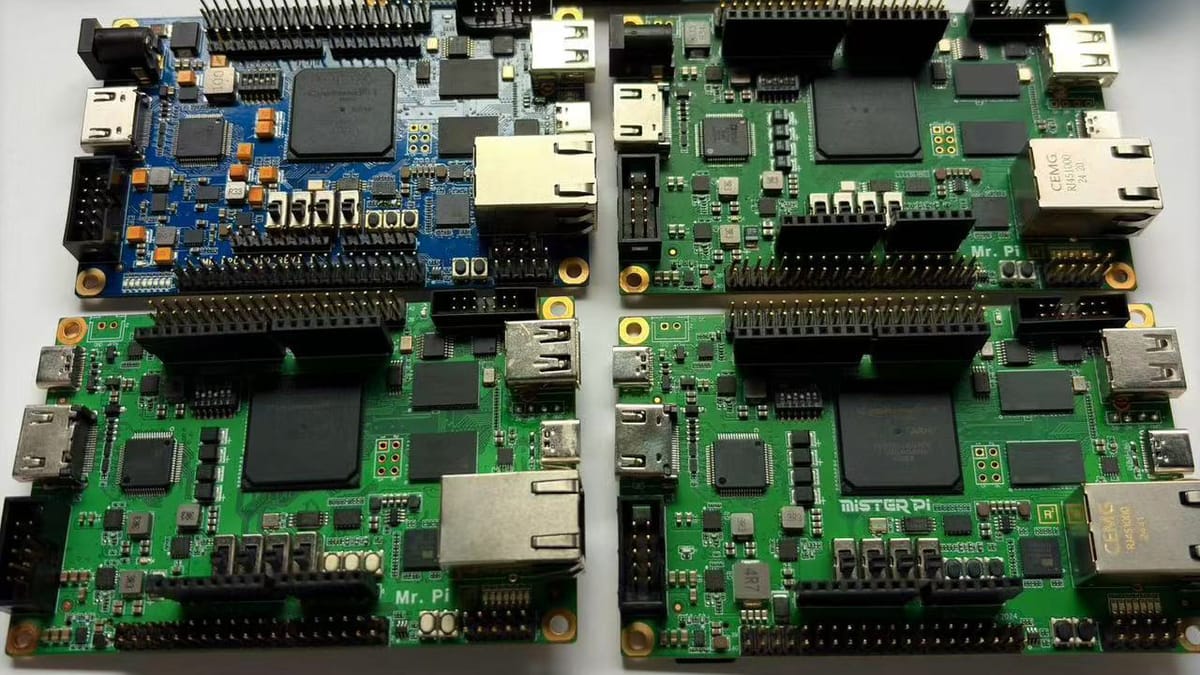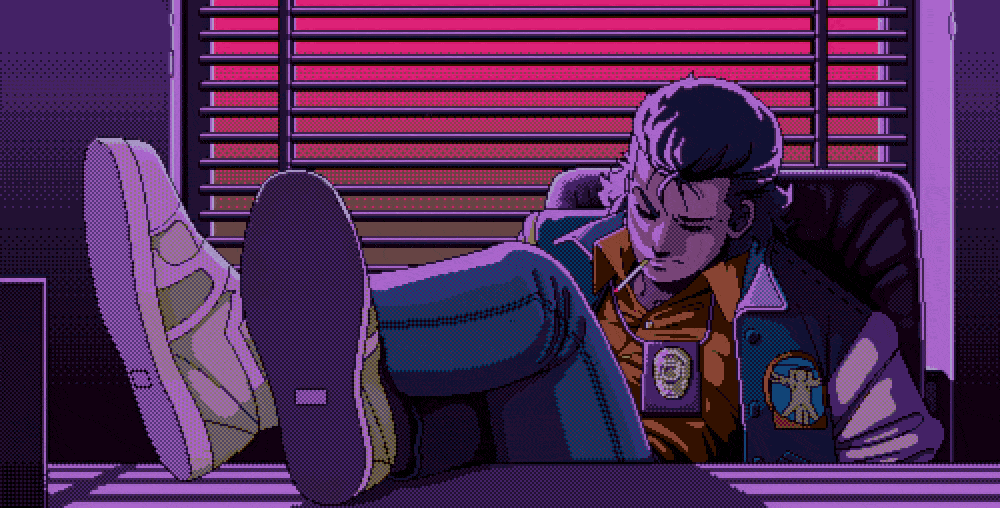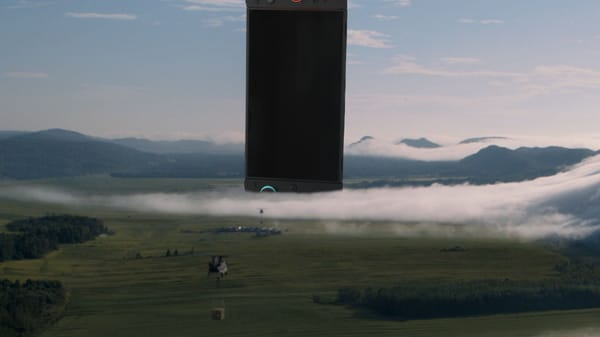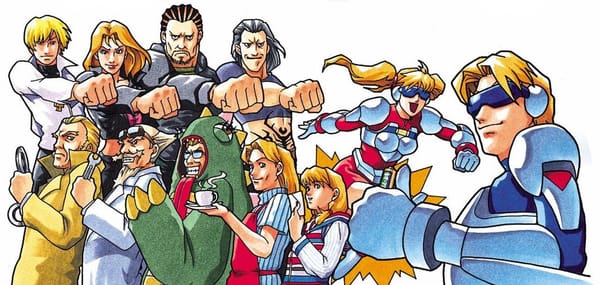The budget MiSTER Pi is back, and this time Taki Udon has a whole team behind him
Plus, we're bringing the emulation scene to Bluesky.

I'm enjoying using the internet so much right now that I keep managing to forget, for entire minutes at a time, that the United States decided to gleefully drive off a cliff a couple weeks ago. We'll spend the next 4+ years seeing how many rocks we're going to hit on the way down. But in the meantime, hey, I'm genuinely excited about social media for the first time in years?
One of our two main stories this issue is about Bluesky (and the emulation folks you should follow there!), which is full of cool people, growing by a million a day right now, and all-around good vibes with the folks I follow. Everyone's experience will vary of course and social media is still probably on-the-whole bad for our brains, but I'm jazzed about Bluesky for more than just its early Twitter feel at the moment. I like the way it's built: every user is basically a website, an architecture that embodies Bluesky's open design and attempt to "protect" the protocol from the company that has created it in the future, when capitalism inevitably corrupts, etc. I also enjoyed this interview with Bluesky's CEO Jay Graber about the future of the social web.
Writing this newsletter for the last year and a half has made me more and more interested — and excited — about the indie web movement. Newsletters, RSS, open source social platforms, less reliance on search and monolithic tech companies. A lot of that stuff just so happens to philosophically align with emulation. And given the beating open source emulation has taken from billion-dollar companies this year, it's nice to have something to feel a bit idealistic and optimistic about!
If you'd like something a bit more physical to get jazzed about, though, our top story this issue is about the return of the MiSTER Pi, and I caught up with creator Taki Udon to chat a little about the impending restock, which should be landing very soon.
One other thing before getting into the news: since last issue, ROM has passed the 2,000 subscriber mark, which I'm really thrilled about. Thanks to so many of you for subscribing and reading regularly and bearing out the idea I had, a couple years ago, that a digest focused on emulation sounded pretty dang good to me and therefore might sound pretty good to other people too. Of course there are much bigger gaming newsletters out there, but I'm still proud to have found so many people who want to read about this very specific corner of the hobby. And if you have any friends you haven't badgered into subscribing yet, please do — word of mouth's the only word I got!
I celebrated hitting 1,000 subscribers with a game giveaway last year, and I'd like to do something like that again for 2,000, so keep an eye out! And with that, let's get on with the show.
The Big Two
2. MiSTER Pi: The second batch and beyond

Since Taki Udon launched the first batch of his budget MiSTER FPGA board a few months ago, a whole lot has changed — at least inside the budding company. "I started by filling positions that I was mostly doing by myself," Taki Udon told me. "I hired a customer service rep, a person to manage supplier shipments, and then I hired QA/shipping staff. Right now, we have 5 full-time staff and two temporary staff. We will probably need 10 full-time staff in a few months to manage more products/projects."
The first batch of $99 FPGA boards sold through almost instantly, and since then Taki's been making adjusments for the second batch, stocking up, and doing QA to spot check issues. For a third batch to be sold down the road, some small modifications are already in motion. "MiSTER Pi is an R&D board for our consoles," Taki Udon said. "The consoles use BGA SDRAM, so we are updating MiSTER Pi to be able to support it as well. Using BGA SDRAM also simplifies production because it is one less board that we need to worry about."
Taki said that his biggest takeaway from the first batch was the value of doing QA, and as much else as possible, internally. "I have never been a fan of outsourcing crucial aspects of product development or product manufacturing. In almost every case, the person you outsource to will do a much worse job than if you had done that work internally where you could have direct oversight. My previous companies favored doing outsourced assembly and QA to save on cost, but history has shown me that is a mistake. Going forward, I will structure the company to do everything in-house. If we have no major issues, I will reward the team. If we do something wrong, I will see where we can improve."
As of this newsletter going out on Sunday, we're roughly a day away from the MiSTER Pi team launching batch 2 — at a $5 discount, a salvo with a message behind it. "A group of individuals with a competing interest are angry that we are selling affordable MiSTer hardware," Taki tweeted on November 5. "As a middle finger to them and thanks to the people who actually matter, all Batch 2 MiSTER Pi = -$5. If you were threatened before this, it's going to get much worse."
Taki told me he'd prefer not to talk about that competing interest, but we did touch on what he expects for batch 2 — and what's still up in the air. The structure of the sale will be straightforward: all the units will go up at once, limited to one per customer. If they sell out instantly when they go on sale on Monday — which I suspect is very likely — he's considering pre-orders for the third batch. But he says he still doesn't have a good sense of how much demand is actually out there.
"There are risks in everything, but I don’t think our current batch is unmanageable," he said. "If we had to scale up from this, that would be unmanageable due to the sheer amount of capital needed to buy raw components and pay suppliers. Thankfully, I haven’t had any big shipping or manufacturing issues for MiSTER Pi that keep me up at night."
As for those consoles he alluded to? Those are very much still in the works, as he's teased somewhat recently.
— Taki Udon (@TakiUdon_) November 3, 2024
Taki says the two systems are currently in development, and he doesn't know which will be finished first.
As big a year as 2024's been for FPGA hardware — before budget MiSTer boards appeared from Taki and QMTech, it was a far pricier hobby to get into — I have a feeling 2025 may end up even bigger.
2. Into that big Bluesky

For the last year and a half, Twitter has been an important resource for me in writing Read Only Memo. I don't use the site day-to-day anymore and try to ignore the circus of garbage that passes for the algorithmic feed, but a list I put together of emulator programmers, translators, and news accounts resulted in more than a few of the stories in past issues. But ex-Twitter is fully and thoroughly cooked, and I'm ready to fully cut it out of my life and work as soon as possible. The good news: so are a hell of a lot of other people!
There's been an incredible eXodus in recent days, with millions of folks ending up on Bluesky. It's a change I've been waiting and hoping for all year. While Mastodon may still be the network of choice for the more programming-minded, I think there's a decent chance that a critical mass of emulation community folks end up on Bluesky. In the future, the distinction between the two may not even matter—thanks to Bridgy Fed, it's actually possible to follow people across the fediverse. But in the meantime, I've settled on Bluesky as the more vibrant social space and want to do my part to give emulator developers and translators some extra visibility. That's why I put together a dedicated feed that anyone can follow!
Just follow the link and click "Pin to home screen" to make it easy to tab over to. You can also go to your feeds settings to rearrange your pinned feeds.
Currently the feed includes emulator programmers, romhackers, official accounts like Dolphin's, translation writers and editors, and some specialist gaming news outlets that tend to cover this domain of retro gaming. I hope to keep adding to it over time, but it's already a quality group of folks. If you're on Bluesky, you can add the feed for easy browsing anytime you want to dive deeper into this hobby, and then choose to follow whoever on the feed you want individually. I figured this was a better approach for emulation than a Starter Pack, which gives you a list of people to follow. If you don't want to totally inundate your main following feed with folks who post about emulation, this gives you a way to tab over to it whenever you're in the mood. That said, maybe I'll adapt it into a starter pack too later on.
Meanwhile, here are some great gaming starter packs to check out already!
- Kate Willaert's Gaming History & Preservation and the Expansion Pack
- Thomas Fuchs' Retrocomputing
- Project Dolphin's Retro Gaming
That's my Bluesky pitch for the moment. I've seen some people hemming and hawing over whether Bluesky will stay good forever or eventually turn sour, be ruined by Big Tech, etc. And honestly, I'd say it doesn't matter—nothing lasts forever, what people want out of social media and life changes, and so on and so forth. It's okay if it doesn't last forever! It's good now, and if it suits you, you should enjoy it while you can.
Patching In

PPSSPP 1.18 is a big deal for ioS – This update landed just as last issue was going out so it didn't make it in, but there's a chonky new version of PPSSPP out there now! It includes fixes for "a lot of potential crashes," more mappable actions, installing saves directly from ZIP files, and improved Android VR support. The most notable improvement is for iOS though: "iOS support is now official and has been greatly improved, compared to old side-loaded builds. It's now nearly feature complete, only missing microphone emulation and a few minor UX things like easily setting a background image in the menu. A lot of iOS-specific optimizations have been implemented to keep performance as good as possible, even though we can't use JIT." Grab it here.
Xbox emulator Xemu gets a bump – The latest build of Xemu properly scales up cel shading black outline thickness "to enable scaling the line width to match the render scale. This helps maintain the art direction in Dragon's Lair 3D, but it also makes the HUD legible at higher resolutions in Steel Battalion: Line of Contact, and makes the UI look more correct at higher resolutions in Steel Battalion Line of Contact and in Steel Battalion."
The successor to Citra / Lime3DS is called Azahar – As mentioned in a recent ROM, some Citra fork devs are banding together to create a new successor, and it now has a name and a website. No release yet.
— Azahar Emulator (@azahar-emu.org) 2024-11-16T17:24:38.063Z
Shonumi has finally conquered the GBA Play-Yan cartridge – Do yourself a favor and read this monster of an article about reverse-engineering the GBA multimedia cartridge called the Play-Yan, which emulator developer Shonumi has been hacking away on for four-and-a-half years!
Core Report

The Analogue Pocket gets an MSX core – This week developer Marcus Andrade released his first vesion of an openFPGA core for the Japanese PC platform! It doesn't currently support a virtual keyboard, so you're probably best off using this core with the pricey Pocket Dock, if you have one, and a physical keyboard plugged in. Andrade lists floppy disk support (.DSK), cassette support (.CAS), and on-screen keyboard as features stll in the works.
MiSTer's Irem M90 core comes online – Not to be outdone, the MiSTer now has a new active core: the Irem M90 arcade system. There weren't many games for system, so this is basically a dedicated Bomberman core. But it's an official one, so it should be easy to grab for all MiSTer owners! Here's a great thread from dev Martin Donlon on solving a particular graphical issue with Bomberman World:
This is what the Bomber Man World title screen looked like in MAME and my MiSTer core. It's not supposed to look like that. It uses a technique called "row scroll" which applies an offset to each line of a background layer. One example of this is the parallax floor effect in Street Fighter 2.
— Martin Donlon (@wickerwaka.bsky.social) 2024-11-12T17:01:17.641Z
Jotego's WWF Superstars and Midnight Resistance cores go public – Freed from Patreon privacy, Jotego's WWF Superstars for MiSTer is now available in update_all, while his Analogue Pocket core for Midnight Resistance is available to all, too! There's also a new beta core for 1985 World Cup if you're a subscriber.
Translation Station

Otogirisō 1.0, again – It's mighty quiet on the translation front this week, but the great Bowl of Lentils pointed out that a fan translation for Otogirisō, first released in beta form a year ago, hit 1.0 in October. This horror visual novel directed by the founder of Chunsoft was released for the Super Famicom in 1992 and developed side-by-side with Dragon Quest V, so you could say it has some historical heft to it.
This is not the only translation for the game: veteran duo Tom & DDS actually released their translation in March 2024, which I apparently neglected to feature! I have no doubt that version is stellar, and it's probably the one I'd gravitate towards first. But I also want to congratulate solo hacker/translator ButThouMust for this more recent 1.0 release, and all that came with it, as they posted on Github: "This is the first release where I made all my source code, notes, tools, etc. available for people to download (see here - will eventually merge into this repo)." ButThoMust is now working on Kamaitachi no Yoru, aka Banshee's Last Cry, Chunsoft's follow-up; only a much, much later port has been released in English.
Good pixels

I've shared a few Bluesky screenshotters in the newsletter before, but it's time to really go ham on 'em. Look at all this pixel goodness.
Using a homebrew app to make it look like you’re playing in a windows emulator while using real hardware is exactly my kinda goblin mode.
— Aidan Moher (@aidanis.fun) 2024-11-17T01:02:44.891Z
Chiemi // Fairytale Red-Zone // PC-98
— PC-98 Bot (@pc98bot.gang-fight.com) 2024-11-14T16:00:52.631Z
Hey it's Scanline Sunday! Post your scanlines Diehard Arcade Saturn, S-video Sony PVM-1954Q
— Goodnews (@goodnews.computer) 2024-11-03T14:59:21.370Z
Legend of Legaia (1998, Prokion) - PS1 Raw Pixels vs. MiSTer S-Video via Sony KV-27S43 Very important game to me. The first JRPG that really caught my eye and got me interested in the genre. The battle system is still so cool and unique. it’s wild we haven’t seen more of it.
— CRT Pixels (@crtpixels.bsky.social) 2024-10-25T23:36:17.781Z
"The pinnacle of 3D shooting on Mega Drive" - that's how this cute-em-up and shoot-em-up was regarded by one publication. And y'know what? The game itself makes a damn good case for itself to be called such. So impressive on a technical level too. 📺: Panorama Cotton, Success, 1994 (Mega Drive RGB)
— Sasha's Retrobytes (@sharkabytes.bsky.social) 2024-11-14T14:13:16.361Z
SHATTERHAND NATSUME 1991 NES
— DOKI DOKI CRT PANIC (@crtpixel.bsky.social) 2024-11-11T23:55:43.765Z
Hey it's Scanline Sunday! Post your scanlines
— Goodnews (@goodnews.computer) 2024-10-20T15:59:48.027Z
Scanline Sunday is upon us!
— Turom (@turom.bsky.social) 2024-11-16T23:34:03.638Z





